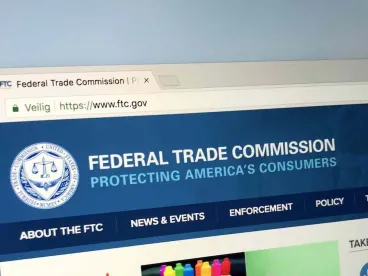A unanimous Supreme Court yesterday significantly curtailed the FTC’s ability to obtain the equitable monetary remedies of restitution and disgorgement of profits from entities accused of engaging in deceptive practices in violation of the FTC Act. In so holding, the Court drew heavily on its interpretation of the language and history of that statute in concluding that allowing the FTC to dispense with administrative proceedings to obtain the equitable monetary remedies of relief would be to “allow a small statutory tail to wag a very large dog.” AMG Capital Mgmt., LLC v. FTC¸ No. 19-508, slip op. at 8–9 (Apr. 22, 2021).
Under the FTC Act, the FTC may enforce the Act’s prohibitions on unfair or deceptive acts or practices either by commencing administrative proceedings under §5 of the Act or by suing a party in court under §13(b) of the Act. The Act expressly authorizes the FTC, when going the administrative proceeding route, to seek civil penalties for violations of a final cease and desist order issued at the completion of this process. While §13(b) does not reference the availability of monetary remedies—it merely authorizes the FTC to seek a “permanent injunction”—the FTC routinely uses §13(b) suits to seek equitable monetary awards of restitution and disgorgement. Indeed, §13(b) has become the FTC’s primary tool for enforcing the Act.
The Supreme Court’s decision in this matter arose out of a §13(b) suit the FTC brought against the petitioner for deceptive pay-day loan practices. The district court granted the FTC’s motion for summary judgment, awarding an injunction and ordering the petitioner to pay $1.27 billion in restitution and disgorgement. The Ninth Circuit affirmed, holding that circuit precedent “empower[ed] district courts to grant any ancillary relief necessary to accomplish complete justice, including restitution.”
The Supreme Court disagreed. The Court noted that Congress amended the FTC Act in the 1970s to add §13(b), allowing the FTC to seek a court-ordered “permanent injunction.” In context, the Court found the words “permanent injunction” in §13(b) have a limited purpose as applying only to injunctions, and could not be read as allowing the FTC to directly obtain court-ordered monetary relief. The provision only discusses relief that is prospective, not retrospective. Based on this, the Court determined Congress enacted §13(b) to address the problem of stopping seemingly unfair practices from taking place while the FTC determines their lawfulness.
Moreover, other provisions in the FTC Act, which were enacted after §13(b), give district courts the authority to impose conditioned and limited monetary relief. The Court found it unlikely that Congress would have enacted these provisions if §13(b) had already implicitly allowed the Commission to obtain those same forms of monetary relief and more.
This ruling may significantly curtail those efforts, and may result in greater use of §5 proceedings to fulfill the FTC’s mission. Watch this space for further developments.




 />i
/>i

